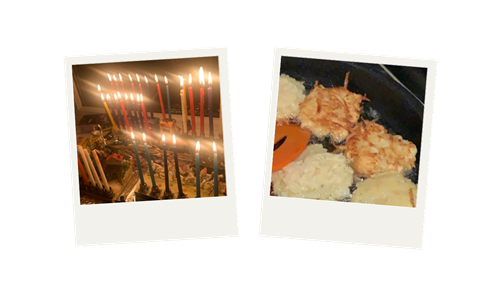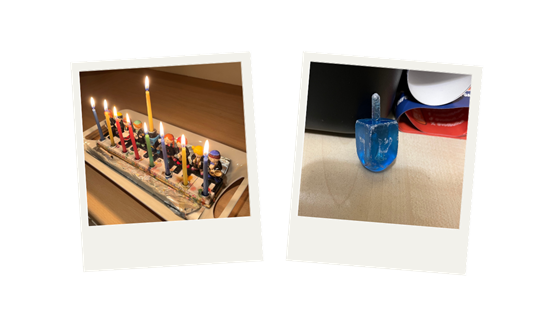Happy Hanukkah
This year from Thursday 7 to Friday 15 December, the Jewish community come together to celebrate Hanukkah, or Chanukah, also known as the Festival of Lights, meaning “dedication” in Hebrew.
The eight-day festival commemorates a momentous occasion in Jewish history; the rededication of the second Temple of Jerusalem in second century BC following the Maccabees’ rebellion against the Greeks.
Previously, the Greeks had banned all Jewish rituals and customs. A small group of Jewish people called the Maccabees rebelled against this and, after a three-year war, won, but their temple was destroyed. They repaired and cleaned the temple, and to celebrate their victory, lit an oil lamp to rededicate it to their own God.
Even though there was only enough oil to burn the candle, it miraculously burned for eight days. This is why the Hanukkah festival lasts for eight days and why light is important in the celebration. Hanukkah also takes place on different days each year, depending on the Hebrew calendar.
How is Hanukkah celebrated?
There are many ways that Jewish people observe this holiday.
Many Jewish people celebrate by lighting a nine-branched candlestick called a Hanukiah, playing a special game called dreidel and eating delicious foods such as sufganiyot (similar to jelly doughnuts) and latkes (fried potato pancakes). These foods are often fried in oil, commemorative of the miracle of the Maccabees’ long-burning oil.
Hanukkah can also be a fun time, as some people receive gifts and Hanukkah money. Some families give each other a small present on each of the eight nights of Hanukkah.
How do you celebrate Hanukkah?
We’d love to learn about your Hanukkah celebrations and traditions. Student Evie shares what the occasion means to her:
"Chanukah is the festival of light. It usually falls around December, but because Judaism follows the lunar calendar its exact dates in the Gregorian calendar vary every year. On Chanukah, we light a 9-branch menorah, traditionally 8 of the branches are the same height and the ninth is taller (known as the shamash). On the first night of Chanukah, we light only one of the 8 branches and every night we light an extra one. To me, Chanukah always means bringing light into the world in every sense, by lighting the menorah, gifting presents, giving extra charity, and hosting family get-togethers. Chanukah for me has always been about community, about coming together to celebrate. In my community, this includes singing, dancing, and eating food traditionally eaten on Chanukah, sufganiyot (doughnuts), latkes and chocolate coins. In my house, it’s a tradition to open a small present each night of Chanukah and for us to all light our own Menorah and display them in windows in the front of the house, so the light can be seen."

Likewise, Josh, the Interfaith and Social Change Representative from UoB’s Jewish Society, shares his thoughts:
"Hanukkah for me is an elongated Christmas in the way that my family all come together and celebrate with amazing food, with my personal favourite being the latkes because they are warm when everything else is cold in winter. Singing Mo-at-zur is a highlight in the evening because I know that we sing that right before we exchange presents! Even though lighting the candles on the menorah links to a great miracle in the temple, for me it is the warmth I feel knowing that Jews all around the world are doing the same thing, no matter their circumstances, and it is something that really unites everyone (religious or not). Setting a competition with my sister for who can spin a dreidel for the longest time is a classic example of a great sibling rivalry on what is for me the best festival on the calendar. So much so that I’ve kept the same dreidel in my pencil case for the last 15 years as a reminder of the fun that we have together, always giving me something to look forward to. My family may not celebrate the festivities of Christmas with the tree and the lights, but for me with Hanukkah, we have something just as special."

During the period of Hanukkah, Christmas and all throughout December, you can also visit the Multi-Faith Chaplaincy which offers an inclusive space for prayer, meditation, relaxation and worship, among many other activities. All students and staff are welcome.
If you celebrate Hanukkah, then please reach out to us at studentcommunications@contacts.bham.ac.uk and tell us how you're planning to observe this holiday.